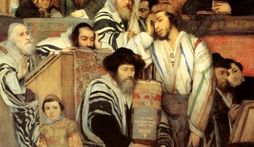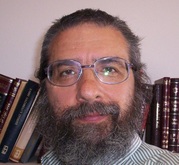 by Avraham Stern Translated by Shoshana Shulman After the Baal Shem Tov was revealed, he spent his time in the villages which fell under the governance of Tchortkov. At that time, the rabbi of Tchortkov was the gaon (Torah genius), Rabbi Hirshele. (He was the father of the two holy gaonim, Rabbi Shmelke of Nikolsburg and Rabbi Pinchas of Frankfurt-am-Main.) The Torah leaders of that time wrote to Rabbi Hirshele that he should prevent the Baal Shem Tov from performing wonders and giving amulets. Rabbi Hirshele ignored this. One time there came before him a halachic question regarding a woman who wished to go that night to the mikveh, and he gave her permission to do so. Rabbi Hirshele was one of the marei dechushbana: one of those who every night before going to sleep take an account of what they have accomplished that day. It seemed to him that according to Jewish law he had been mistaken in his ruling and wrongly answered the woman’s question. He ran and knocked at the woman’s house. Through the window, he let her know that her immersion in the mikveh had been ineffective, for he had made a mistake. But the woman’s husband told him that he was too late, for they had already been together. Rabbi Hirshele went home with great bitterness, and he began to consider: What sin had he committed before, which—with the power of “one sin brings forth another sin”—had brought him to this mistaken judgment? He finally decided that this had occurred because he had not obeyed the leaders of the generation who had instructed him to harass the Baal Shem Tov. He woke his assistant and soon that same night traveled to the village in his governance where the Baal Shem Tov could be found. When he entered the Baal Shem Tov’s room, he found a large gathering of people. He saw a woman crying before the Baal Shem Tov that it was already several years since her husband had abandoned her, and she had been left an agunah. The Baal Shem Tov got up, went to out to the street and to an unclean place [to relieve himself], and then returned to the house. Without washing his hands, he again looked at the agunah’s kvittel, her note, and told her the name of the place where her husband could be found. He told her to travel to him and blessed her that she should easily come to an agreement with him: either to get back together with him or else to receive a divorce. No one there knew Rabbi Hirshele. He stood frightened and astounded at the door, and thought to himself that the Torah leaders who wished to harass the Baal Shem Tov were entirely correct. One really saw that these miracles were not from the clean side. But immediately the Baal Shem Tov called for water. He washed his hands and said the blessing, asher yatzar [recited after one goes to the bathroom]. He then went over to Rabbi Hirshele and said, “Shalom Aleichem, Rabbi Hirshele Tchortkover! Your suffering and concern regarding the question from yesterday is unnecessary, because you answered correctly.” And the Baal Shem Tov quoted by heart a Tosafos in Gemara Nidah, which permits a woman in such a case to go to the mikveh. “And you should also not wonder,” the Baal Shem Tov continued, “that in the middle of [reading] the kvittel, I interrupted with uncleanliness, and looked at it a second time without having washed my hands. You should know that I looked for her husband in the next world and didn’t find him—neither in Gan Eden nor in Gehinnom. After that, I looked for him where Jews are found, in all the holy places in this world, and didn’t find him there either. I had to bring myself down to the unclean places of this world. There I found him. It is a great danger, but what will one not do to save a Jewish soul, and also so that a Jewish daughter should not remain an agunah?” Rabbi Hirshele traveled home a happy man, and he cautioned others not to bother the Baal Shem Tov.
2 Comments
7/28/2015 01:24:17 pm
What a fine translation, Shoshana! The story is clearly and interestingly told. It is a good reminder to assume that if things are going badly for us, we should look inside, and see if we have wronged someone, and then humble ourselves and make amends. How truly humble were some of our sages! I also hope that today's gaonim will do everything they can b'zman hazeh so that a Jewish daughter should not remain an agunah. Kol hakavod to you, and to your husband for this fine site!
Reply
Miriam Rhodes
7/28/2015 03:50:39 pm
Very nice translation.
Reply
Leave a Reply. |
Yaacov David Shulman
Archives
October 2019
Categories |

 RSS Feed
RSS Feed